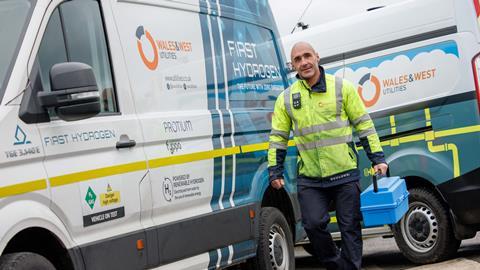First Hydrogen said trials of its fuel cell-powered vehicle (FCEV) with Wales & West Utilities (WWU) were now complete and the first-of-its-kind van had completed its highest-ever mileage of 2,000km.
The four-week trial enabled the FCEV to clock up to 180km (117 miles) per day on mostly urban roads and highways in some of South Wales’ coldest conditions.
First Hydrogen said the vehicle demonstrated the full power capability of the fuel cell module, with outputs higher than 60kW in transient accelerations, showing capability for demanding duties, such as carrying heavier payloads, towing and powering auxiliary equipment.
Trial data released last month had already shown there was no decrease in vehicle performance or range when operating in colder temperatures.
Alun Jones, WWU driver in First Hydrogen’s trials said: “First Hydrogen’s van is lovely to drive and allowed us to get on with our job.
“The fact you can quickly refuel rather than charge up overnight is a massive advantage for us as sometimes we respond to calls from our homes in the middle of the night. I can definitely see the hydrogen vans working at WWU in terms of the efficiency we need.”
Stephen Offley, transport manager for WWU, said: “We are impressed with how the van operates and its overall performance – particularly as this is a prototype vehicle and we were breaking new ground by creating our own hydrogen vehicle ecosystem.
“Testing the vehicle with our FCOs meant we could demonstrate its use in a front-line service role and provide credible findings for us to share with our stakeholders and other fleet managers.
“The data generated from the trials also gives us a case to push for fixed hydrogen infrastructure in the area so we can benefit from faster refuelling and operational simplicity.”
Steve Gill, executive director automotive, First Hydrogen, said: “We’re thrilled with the feedback from Wales & West Utilities. Having covered more miles in a single trial than ever before, we have generated a significant amount of vehicle data.”
First Hydrogen added that the trials had proved that hydrogen mobility was still possible for fleet operators without access to fixed hydrogen refuelling infrastructure.













![First Hydrogen trials with Wales and West Utilities[71037]](https://d2cohhpa0jt4tw.cloudfront.net/Pictures/100x67/1/0/0/17100_firsthydrogentrialswithwalesandwestutilities71037_343804.jpg)
![First Hydrogen commences vehicle trials with Wales & West Utilities[70370]](https://d2cohhpa0jt4tw.cloudfront.net/Pictures/100x67/8/4/6/16846_firsthydrogencommencesvehicletrialswithwaleswestutilities70370_462463.jpg)